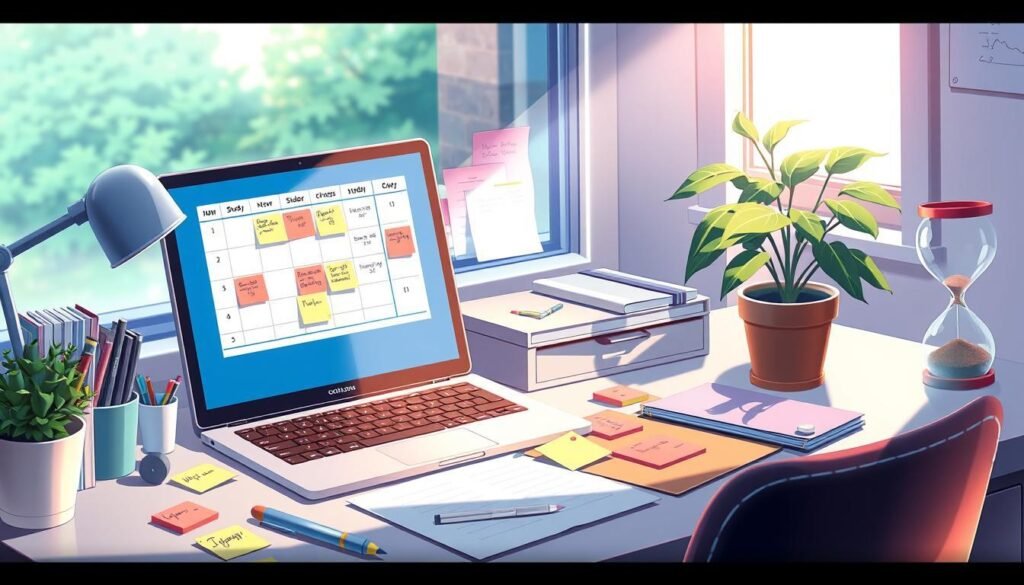As a student, you might often find yourself putting off tasks until the last minute. This can really hold you back from doing well in school. But here’s the good news: you can beat procrastination. With the right mindset and strategies, you can start studying better and reach your goals. This article will give you simple tips to help you stay focused and make the most of your time.

We’ll talk about how to create a great study space, deal with digital distractions, and build good study habits. You’ll learn to break big tasks into smaller ones, use time-blocking, and set up reward systems. By adding these tips to your daily routine, you’ll be on your way to beating procrastination and doing well in school.
Key Takeaways
- Procrastination is a common obstacle to academic success, but it can be overcome with the right strategies.
- Creating a conducive study environment is key to staying focused and productive.
- Effective time management and task prioritization are vital for reaching your academic goals.
- Using reward systems and accountability can keep you motivated and on track.
- Developing healthy study habits and a growth mindset is essential for overcoming procrastination and succeeding.
- Practical tips for students, like breaking tasks into smaller chunks and using productivity apps, can help you stay organized and focused.
Understanding Why Students Procrastinate
As a student, you might often find yourself putting off tasks until the last minute. This habit is tempting but understanding why you do it is key. Procrastination tips often focus on how to stop it, but first, let’s explore why it happens. Fear of failure, perfectionism, or lack of motivation are common reasons.
When looking at procrastination tips, it’s important to know why you procrastinate. By figuring out the reasons, you can find ways to overcome it. Common reasons include tough assignments, exam stress, or unclear goals. Recognizing these can help you start changing your habits and doing better in school.
Here are some key points to consider when trying to overcome procrastination:
- Break down large tasks into smaller, manageable chunks
- Set clear goals and deadlines for yourself
- Use productivity tools and apps to stay organized
- Find a study group or accountability partner to help you stay motivated
By following these tips and understanding procrastination, you can beat this habit. This will help you succeed in your studies.
| Trigger | Strategy |
|---|---|
| Challenging assignments | Break down into smaller tasks, seek help from instructor or tutor |
| Exam pressure | Develop a study schedule, use active learning techniques |
| Lack of clear goals | Set specific, achievable goals, create a vision board or mind map |
Creating Your Ideal Study Environment
As a student, you know how important a dedicated study space is. It helps you stay focused and productive. To make the perfect study area, follow tips for students that help you stay organized and avoid distractions. Begin by cleaning up your desk and the area around it. Make sure only the things you need for studying are nearby.
A study space that is well-lit and comfortable is key. Good lighting can reduce eye strain, and a comfy chair and desk prevent tiredness. Think about getting a good chair and a desk that meets your needs. Also, tips for students suggest using a noise machine or soft music to keep things calm.
To make your study area even better, try to cut down on digital distractions. Use website blockers or apps to help you stay on task. Setting a schedule for studying and breaks can also help you stay focused and avoid putting things off. By using these tips for students, you can make a study space that boosts your productivity and helps you reach your goals.
- Declutter your study space to reduce distractions
- Invest in proper lighting and comfortable seating
- Use noise machines or calming music to create a peaceful atmosphere
- Minimize digital distractions using website blockers or apps
By following these tips for students, you can make a study environment that keeps you focused, productive, and motivated. Remember, a tidy and comfy study space is key to doing well in school.
Essential Procrastination Tips for Students
As a student, you might know the feeling of putting things off until the last minute. This can cause stress, lower grades, and regret. But, you can change this by learning procrastination tips for students. These tips can help you stay on track and reach your academic goals.
Here are some effective tips for students to beat procrastination:
- Start small: Break down big tasks into smaller ones. This makes it easier to start and stay motivated.
- Use the Two-Minute Rule: Do tasks that take less than two minutes right away.
- Time blocking: Set specific times for studying, relaxing, and other activities. This keeps things balanced.
By using these strategies, you can manage your time better, stay focused, and avoid procrastination. Changing habits takes time and effort. So, be patient and keep going. With the right procrastination tips for students, you can beat procrastination and succeed in school.

| Tips | Benefits |
|---|---|
| Start small | Reduces overwhelm, increases motivation |
| Use the Two-Minute Rule | Saves time, boosts productivity |
| Time blocking | Improves time management, reduces stress |
Managing Digital Distractions Effectively
As a student, you know how tempting digital distractions can be. Social media, email, and texts all vie for your attention. To stay on track, you need tips for students to handle these distractions and balance online and offline life.
Try setting specific times for checking social media and email. This can prevent endless scrolling and keep you focused. You can also use app blockers to limit access to distracting sites during certain hours.
Productivity Apps and Tools
Many apps and tools can help you stay focused. Some top picks include:
- Todoist: a task management app for organizing your tasks
- RescueTime: tracks how you spend time on your devices
- Freedom: blocks distracting websites and apps on all devices

Setting Digital Boundaries
Creating digital boundaries is key to a healthy balance. This means setting device-free times or days. It also means having a dedicated study area free from distractions. And, it’s important to set clear times when you’re available to chat or text.
By using these strategies and the right tips for students, you can manage digital distractions. Remember, finding a balance that suits you is the goal.
Building Better Study Habits
To beat procrastination, you need to build habits that help you stay productive and consistent. As a student, procrastination tips for students can guide you in making a study plan. This plan helps you manage your time well and excel in your studies.
It’s key to regularly review your course material to keep the information fresh in your mind. Techniques like active recall and spaced repetition can help solidify your learning. Also, good note-taking skills keep you organized and focused in class.
Don’t forget to take care of yourself with enough sleep, healthy food, and exercise. These habits boost your focus, motivation, and grades. Here are some habits to think about:
- Set realistic goals and deadlines
- Create a study schedule and stick to it
- Use productivity tools and apps to stay organized
- Prioritize self-care and take regular breaks
By adopting these procrastination tips for students, you can develop good study habits. These habits lead to success in school and less stress. Remember, it takes time and effort to build these habits, but they’re worth it.

Begin by making small changes to your daily routine. Then, gradually make bigger changes. With hard work and commitment, you can beat procrastination and reach your academic goals.
| Study Habit | Benefits |
|---|---|
| Regular review of course material | Improved retention and understanding of information |
| Effective note-taking techniques | Better organization and focus during lectures |
| Self-care habits (sleep, nutrition, exercise) | Improved physical and mental well-being |
Motivation Strategies That Keep You Going
Staying motivated is key for students aiming to reach their academic goals. Finding your personal why is a top tip. What makes you want to study? What are your big dreams? Linking your daily tasks to your long-term goals keeps you focused and motivated.
Having accountability partners and study groups is also vital. Being around people with similar goals creates a supportive community. You can exchange tips, learn from each other, and stay motivated. Look for study groups online, on campus, or through social media groups in your field.
Visualizing Success Techniques
Visualizing your success can be a strong motivator. Spend a few minutes each day imagining yourself achieving your goals. See yourself graduating, getting your dream job, or following your passion. This helps keep you driven, even when tasks get tough. Remember, staying organized is not just about being efficient; it’s also about keeping a positive outlook.
By using these motivation strategies every day, you can stay on track and reach your academic goals. Whether it’s finding your personal why, joining a study group, or imagining your success, remember that staying motivated is a journey. With the right mindset and support, you can beat procrastination and succeed as a student.
Overcoming Procrastination During Exam Season
As a student, you’re likely no stranger to procrastination tips for students. But exam season can be tough to stay on track. With lots of material to review and exams to prepare for, it’s easy to delay studying.
But, with the right strategies, you can beat procrastination and reach your academic goals. Start by making a good study plan. Focus on your toughest subjects and break study sessions into smaller parts. Active recall methods like flashcards or quizzes can also help keep you engaged.
Self-care is also key during exam season. Make sure to take breaks, sleep well, and do stress-relieving activities like exercise or meditation. These habits will help you stay focused and motivated, even when studying is hard.
- Make a quiet, comfy study space free from distractions.
- Use apps or tools to stay organized and on track.
- Get support from friends, family, or a study group to stay motivated.
Follow these tips and stick to your study plan to beat procrastination and succeed in exam season. Be kind to yourself, stay positive, and celebrate your progress.
Conclusion: Your Journey to Productive Student Life
Congratulations, you’ve started on a path to a more productive and fulfilling student life. Overcoming procrastination is a journey that needs patience, persistence, and a willingness to try new things. Remember, even small changes can make a big difference over time.
As you keep using the strategies from this article, you’ll start to take back control of your studies. Create a great study environment, manage digital distractions, and work on your study habits. Pick the tips that work for you and adjust them to fit your needs and learning style.
Surround yourself with supportive friends, find people to hold you accountable, and celebrate your wins, no matter how small. With determination and a growth mindset, you can overcome procrastination and reach your full student life. Believe in yourself, and watch your grades, productivity, and well-being improve.
The path to a more productive student life is within your reach. Take the first step, and let this article be the spark for your change. You’ve got this!
FAQ
What are some effective tips to overcome procrastination as a student?
Creating a productive study environment is key. Break tasks into smaller steps and use time blocking to stay focused. Minimize digital distractions and build better study habits over time.
How can I stay motivated and keep going when I’m struggling with procrastination?
Find your personal “why” for studying. Team up with accountability partners or study groups. Use visualization techniques to boost motivation. Remember, overcoming procrastination is a journey. Be patient and celebrate small victories.
What tips can help me manage procrastination during exam season?
During exam season, create a structured study schedule. Prioritize subjects and use active recall techniques. Practice self-care by managing stress and taking regular breaks. Stay focused and perform your best, even under pressure.
How can I set up a study environment that minimizes distractions?
To create a productive study space, keep your desk clutter-free. Ensure proper lighting and eliminate distractions. Designate specific times and locations for studying to train your brain to stay focused.
What are some effective time management techniques to combat procrastination?
The Two-Minute Rule helps you start small tasks immediately. Time blocking schedules specific time slots for activities. Breaking large projects into smaller chunks makes them less overwhelming.